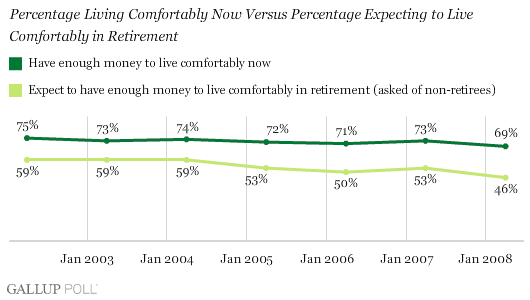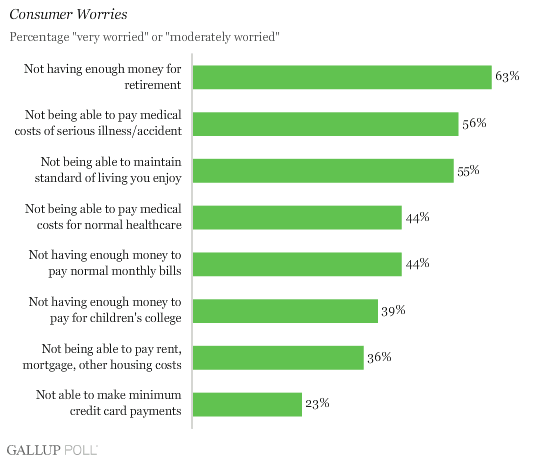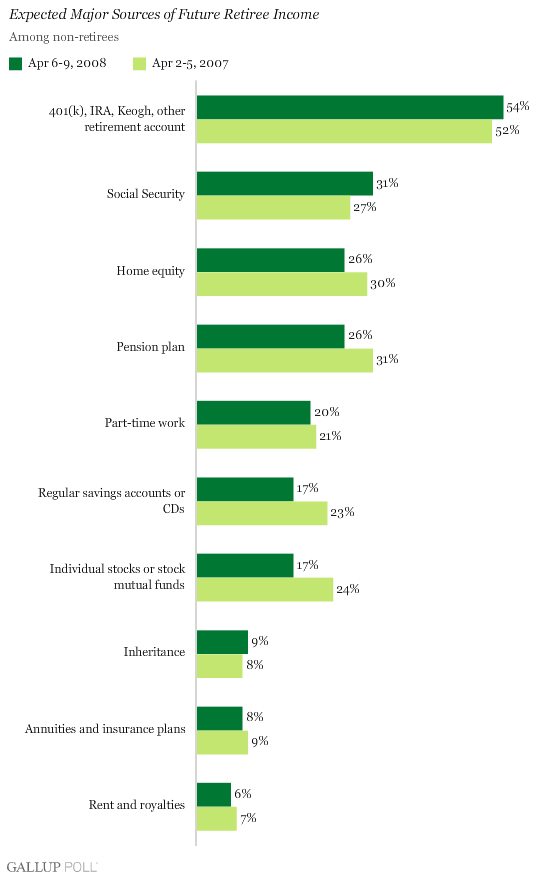PRINCETON, NJ -- Sixty-nine percent of Americans say they are living comfortably right now -- down four percentage points from last year and six points from 2002. However, the percentage of those yet to retire who think they'll be able to live comfortably in retirement fell even more precipitously, dropping to only 46% from 53% a year ago and 59% in 2002.

Many Worried About Having Enough Money for Retirement
When asked about their financial worries in ║┌┴¤═°'s April 6-9 Economy and Personal Finance poll, 63% of Americans say they are worried they will not have enough money for retirement -- exceeding the 56% who are worried about not being able to pay the medical costs associated with a serious illness or accident and the they now enjoy. Even as Americans are bombarded by a wide range of immediate-term economic concerns ranging from surging gas, food, and healthcare costs to a decline in jobs and a debacle in housing, their most prevalent fear seems to be centered on not being able to achieve a comfortable retirement.
In part, this may be an often-unnoticed result of today's economic turmoil. Not surprisingly given the soaring cost of everyday essentials, the percentage of Americans saying they have enough money to live comfortably right now is 69%, down from the 75% of 2002 as well as the 73% of last year. With incomes stagnating and prices surging, fewer Americans have enough income to live comfortably.
In this context, it seems reasonable for fewer Americans to feel confident they will have enough money to live comfortably in retirement, when their incomes are not only generally lower but also relatively fixed. Add in today's comparatively low interest rates, and one might argue that many of the 46% of Americans who think they'll be able to live comfortably in retirement are being somewhat optimistic. Of course, this does represent a 13-point drop from the percentage of Americans holding this view in April 2002 and a seven-point decline from just last year. Note also that the gap between the percentage of Americans feeling they have enough money to live comfortably now compared to those having similar expectations for when they retire has increased from 16 points in 2002 to 23 points today.

Economy Affecting Retirement Income Expectations
Fifty-four percent of those who have yet to retire say they expect their 401(k), IRA, Keogh, or other retirement savings accounts to be a major source of income for them in retirement. This is up two points over the past year, despite the losses some people have experienced in their tax-favored accounts during the recent past. Social Security is mentioned second most frequently, with 31% seeing it as an expected major source of retirement income -- up from 27% a year ago -- and not necessarily good news given the current condition of the Social Security system.
One reason more future retirees fear they will not be able to live comfortably in retirement may have to do with the impact of recent economic trends on their financial well-being. For example, only 17% of future retirees expect individual stocks or mutual funds to be a major source of their retirement income, down by nearly one-third from the 24% who thought these investments would be a major source for them a year ago. There has been a similar six-point drop, from 23% to 17%, in the percentage expecting their regular savings accounts or CDs to fill this role. At the same time, the percentage of those looking to a work-sponsored pension plan as a major source of retirement income has fallen five points, from 31% last year to 26% this year, while those looking to the equity in their homes is down four points, and is now also at 26%.

Commentary
Today's economic stagflation has one in four Americans "very worried" that they will not be able to maintain the living standard they now enjoy. But with many baby boomers approaching retirement age, the full impact of today's economic woes may not be fully realized for several years.
For example, the home has traditionally been the average American's primary source of wealth. However, the current residential real estate debacle now threatens the value of that asset for many. Not only are many Americans experiencing foreclosure, but their neighbors are seeing their housing values plunge as potential purchasers hesitate to buy and as foreclosed properties drive down the value of nearby properties.
At the same time that their real estate values are declining, Americans see the interest rates on their savings deposits at low levels while the risks in the equity markets seem high. And while one in five Americans who have not yet retired now say they expect a part-time job to be a major source of their retirement income -- double the level of 2001 -- this number could grow as an increasing number of baby boomers find that today's economy will make it hard to retire comfortably.
Survey Methods
Results are based on telephone interviews with 1,021 national adults, aged 18 and older, conducted April 6-9, 2008. For results based on the total sample of national adults, one can say with 95% confidence that the maximum margin of sampling error is ┬▒3 percentage points.
For results based on the sample of 310 retirees, the maximum margin of sampling error is ┬▒6 percentage points.
For results based on the sample of 711 non-retirees, the maximum margin of sampling error is ┬▒4 percentage points.
Interviews are conducted with respondents on land-line telephones (for respondents with a land-line telephone) and cellular phones (for respondents who are cell-phone only).
In addition to sampling error, question wording and practical difficulties in conducting surveys can introduce error or bias into the findings of public opinion polls.
To provide feedback or suggestions about how to improve ║┌┴¤═°.com, please e-mail feedback@gallup.com.
